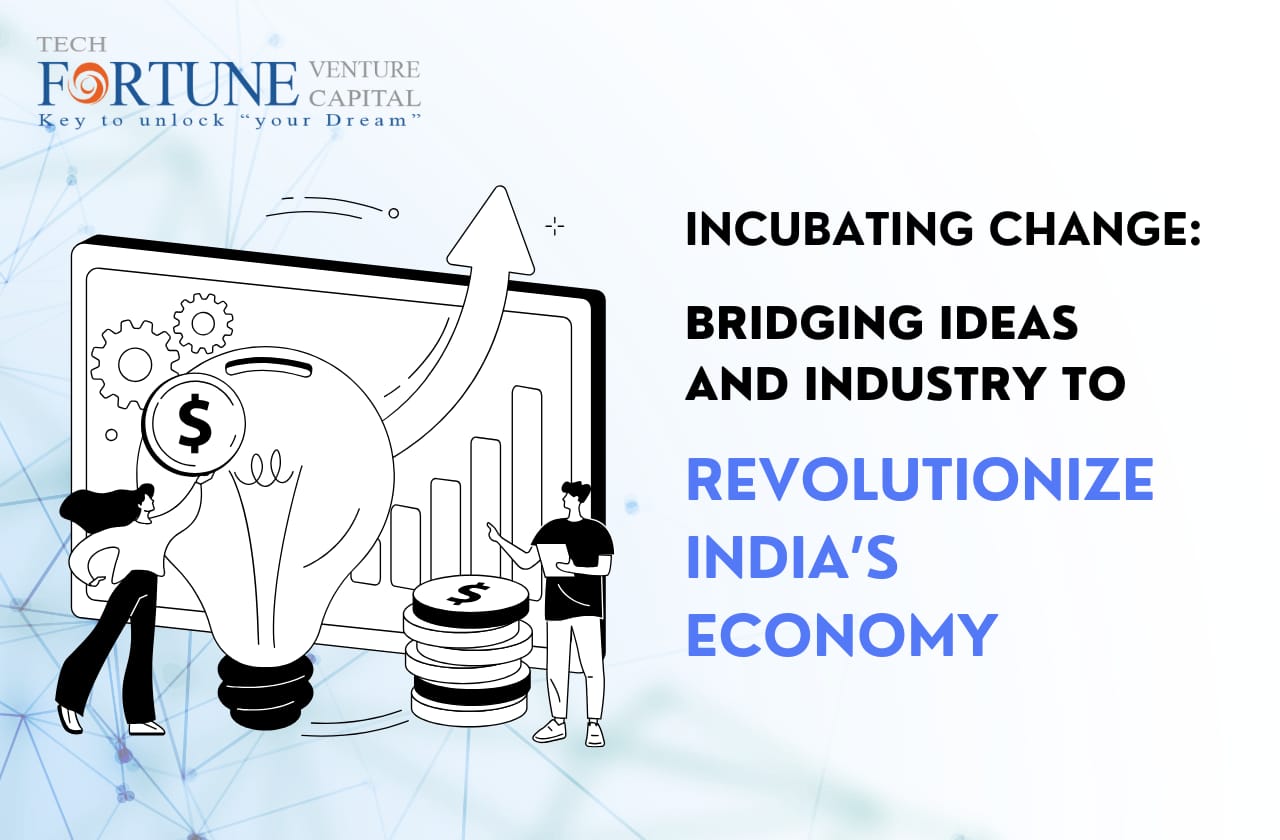“Incubating Change: Bridging Ideas and Industry to Revolutionize India’s Economy”
“Incubating dreams into scalable realities for a thriving ecosystem.“
India has become a vibrant hub for startups, contributing significantly to global innovation. In this context, startup incubators play a pivotal role in nurturing entrepreneurial ideas, turning them into scalable businesses. As we peer into the future, it’s evident that startup incubation in India is poised to evolve, adopting modern strategies and adapting to the dynamic needs of budding entrepreneurs. Let’s explore how this transformation will shape India’s entrepreneurial ecosystem.
The Current Landscape of Startup Incubation in India
India boasts 1,40,803 recognized startups, with over 67,500 led by women directors, showcasing remarkable entrepreneurial growth. with a growing network of incubators providing crucial support. These institutions offer mentoring, infrastructure, funding access, and networking opportunities. However, traditional incubation models often follow a linear approach—offering set services without tailoring solutions to individual startup needs.
Emerging Trends Shaping the Future of Startup Incubation
- Tech-Driven Incubation
Technology is becoming the backbone of modern incubation. Incubators are increasingly utilizing AI and machine learning to analyze startup potential, predict growth trajectories, and customize resources. Virtual incubation platforms, powered by robust tech frameworks, are eliminating geographical constraints, enabling startups from tier-2 and tier-3 cities to access mentorship and funding.
For example, AI-driven analytics can identify early indicators of success or failure, allowing incubators to intervene proactively, fine-tuning their support strategies. - Specialized and Sector-Focused Incubation
The one-size-fits-all model is giving way to specialized incubation tailored to specific sectors. With India’s growing strength in areas like fintech, agritech, healthtech, and sustainability, incubators are designing programs exclusively for these industries.
For instance, agritech-focused incubators can offer access to experimental farms, precision farming tools, and partnerships with agribusiness firms, while healthtech incubators can connect startups with hospitals for pilot projects. - Global Partnerships and Cross-Border Incubation
As Indian startups increasingly aim for global markets, incubators are forming international collaborations. These partnerships provide startups with exposure to global best practices, overseas market entry strategies, and access to foreign funding.
For example, international incubators like Y Combinator and Techstars are now extending their programs to Indian startups, bridging the gap between local innovation and global scalability.
Source: Meet The 12 Indian Startups In The Y Combinator’s Winter 2023 Cohort
- Emphasis on Sustainability and Social Impact
India’s developmental challenges present an opportunity for startups creating solutions with social and environmental impact. Incubators focusing on sustainability and social entrepreneurship are rising, offering support to ventures that address issues like clean energy, affordable healthcare, and education accessibility.
By aligning with global ESG (Environmental, Social, and Governance) standards, these incubators attract investors prioritizing impact-driven businesses. - Startup Incubation in Tier-2 and Tier-3 Cities
With startups mushrooming outside metropolitan areas, the next wave of innovation is being powered by entrepreneurs from smaller cities. Incubators in these regions focus on overcoming unique challenges such as lack of infrastructure, limited investor access, and skill gaps.
The government’s push through initiatives like the Atal Innovation Mission and Startup India is fostering the development of regional incubators, democratizing entrepreneurial opportunities across the nation.
Challenges That Need Addressing
While the future looks promising, there are challenges that need to be tackled for startup incubation in India to achieve its full potential:
- Funding Limitations: Many incubators struggle with consistent funding, restricting the scale of their programs.
- Lack of Industry-Academia Collaboration: Academic incubators often operate in silos, missing opportunities to collaborate with industries for real-world applications.
- Metrics for Success: Standardized measures to evaluate incubator performance and startup success are still lacking.
- Retention of Talent: Many startups, after initial incubation, face hurdles in retaining skilled talent as they scale.
Addressing these issues through policy interventions, collaborative efforts, and innovative practices will be vital for the ecosystem’s growth.
The Role of Startup Incubation in India’s Economic Growth
Startup incubators are not just supporting individual ventures—they are contributing to India’s larger economic narrative. By nurturing startups, incubators:
- Generate Employment
Startups incubated in India are significant job creators, addressing unemployment issues, especially in rural and semi-urban areas. - Boost Innovation
Incubators promote a culture of innovation, encouraging entrepreneurs to solve pressing problems with cutting-edge solutions. - Foster Inclusive Growth
By supporting ventures from diverse regions and backgrounds, incubators are driving inclusive economic growth. - Attract Foreign Investments
A thriving startup ecosystem supported by robust incubators enhances India’s appeal as a global investment destination.
The Techfortune Venture Capital Connection: Redefining Startup Incubation
As startup incubation evolves, platforms like Techfortune Venture Capital are redefining how support is delivered. Techfortune Venture Capital combines technology, expertise, and a global network to empower startups across stages. By offering personalized mentoring, advanced analytics, and seamless funding connections, TFVC ensures startups receive holistic support tailored to their unique needs.
The Path Ahead: What Lies Beyond years | Future scope
The Indian startup ecosystem is on the cusp of a transformative era. By 2027-2028, India aims to become a $5 trillion economy, with startups playing a pivotal role. Here’s what the future could hold for startup incubation in India:
- Hybrid Models: A blend of physical and virtual incubation models will dominate, catering to diverse entrepreneurial needs.
- Deeper Government-Private Collaboration: More PPP (Public-Private Partnership) incubators will emerge, pooling resources to create world-class incubation centers.
- AI-Powered Ecosystems: AI will enable hyper-personalization of incubation services, predicting trends, and customizing resources in real-time.
- Increased Focus on Exit Strategies: Incubators will provide more structured exit roadmaps, guiding startups toward successful acquisitions or IPOs.
Wrap Up:
The future of startup incubation in India is not just about fostering innovation—it’s about creating an inclusive, resilient ecosystem. By embracing technology, sustainability, and global partnerships, Indian incubators can empower entrepreneurs to drive economic growth and societal impact.
For startups looking to turn ideas into scalable businesses, platforms like Techfortune Venture Capital offer unparalleled support, guiding ventures at every step. As India marches toward its entrepreneurial future, the synergy between startups and incubators will be the cornerstone of its success.
FAQ:
Incubation fosters innovation, creates jobs, and strengthens India’s entrepreneurial landscape by nurturing startups. It bridges gaps in resources and expertise, driving economic growth and positioning India as a global hub for innovation.
Technology enables virtual incubators, data-driven decision-making, and access to global mentors. This evolution enhances scalability, inclusivity, and efficiency, making incubation accessible to startups in remote or underserved regions.
Sectors like fintech, healthcare, edtech, and renewable energy thrive in India’s incubation ecosystem, leveraging specialized support to address unique challenges and innovate for local and global markets.
Startups should align with incubators matching their industry, leverage provided resources, and actively engage with mentors and peers to refine strategies, overcome challenges, and build a strong foundation for success.

